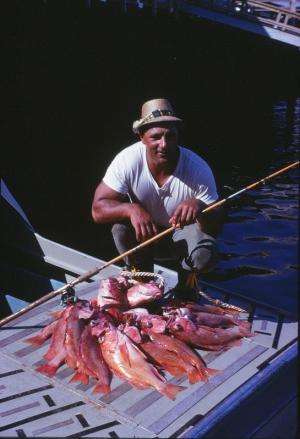New study highlights the value of local knowledge in recovering endangered species

A new study highlights the value of local knowledge in recovering endangered species. The collaborative research, co-authored by NOAA Fisheries, the University of Washington, and researchers from the University of Alaska, Fairbanks, is specifically designed to incorporate the knowledge of recreational anglers into recovery planning for three rockfish species in Puget Sound—bocaccio, canary rockfish, and yelloweye rockfish, each of which was listed under the Endangered Species Act (ESA) in 2010.
The study explores how recreational anglers' understanding of the ecosystem and fishing practices influence their views of conserving Puget Sound rockfish. Through surveys of 443 recreational boat-based anglers, which included scoping questions related to their knowledge of rockfish biology, fishing practices, perceptions of threats to rockfish, and preferences for rockfish recovery measures, several key findings arose.
1. Anglers with knowledge of the long life-span of rockfish and past experience fishing for rockfish showed stronger support for conservation measures and a willingness to take personal action to recover rockfish. This finding highlights the important role education plays in garnering long-term support for rockfish recovery.
2. Anglers' perceptions of threats to rockfish and preferences for conservation measures are shaped by where they fish in Puget Sound. This suggests that place-based management options should be considered when biologically appropriate.
This study builds on additional research that synthesizes local knowledge of fishermen, divers, and researchers to address gaps in our understanding of historical rockfish abundance patterns. Anne Beaudreau with the University of Alaska, Fairbanks, and NOAA Fisheries found strong correlations between people's observations and available scientific data—improving our confidence that abundance trends of rockfish derived from interviews reflect true patterns in nature.
Rockfish have a remarkable life history. They are born as free-swimming planktonic larvae, and remain in open waters for several months before settling to the seafloor as juveniles. As they grow, rockfish move to deeper waters near rocks or other seafloor structures. Most rockfish species do not become reproductively mature until they are 5 to 20 years old, and some individuals can live over 100 years. These seemingly abundant fish were subjected to overfishing in Puget Sound for decades. The studies confirmed that there was agreement among fishermen and researchers that rockfish declined in abundance, with the most marked changes happening in the 1970s and 1980s.
People's views about the magnitude of rockfish declines since the 1940s varied based on age and experience with the marine environment. These differences highlight the need to account for perceptual differences among respondents when interpreting local knowledge.
"Many anglers have decades of experience on the water, and a wealth of knowledge that we must draw on," said Dan Tonnes, NOAA Fisheries Recovery Coordinator. "These studies underscore the importance of working with them to better understand rare species, like rockfish. Fishermen have the most experience with these species, from knowing where they used to catch them to observing their decline over several decades. Tapping into this knowledge is critical to recovery efforts."
NOAA Fisheries is in the process of developing a recovery plan for the three ESA-listed rockfish species in Puget Sound, and has used these studies to develop cooperative research projects and education and outreach strategies. Managing and recovering these species is incredibly complex given the interaction between social and ecological systems in Puget Sound. Fortunately, these studies provide a framework for engaging stakeholders to better understand their relationship to the species—knowledge that is invaluable not only to the development of a comprehensive recovery plan, but to its successful implementation.
Provided by NOAA Headquarters















